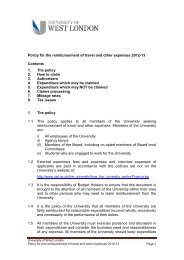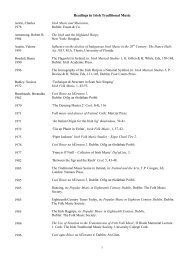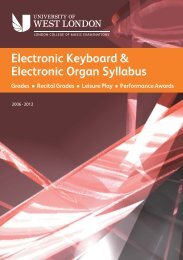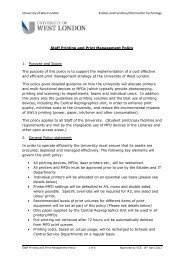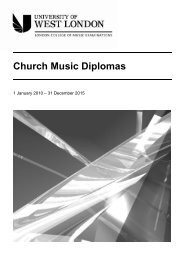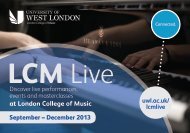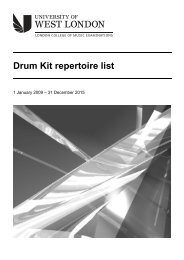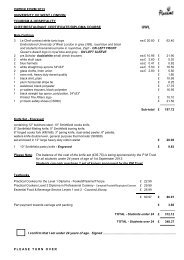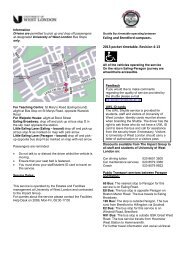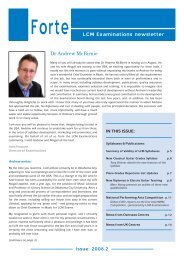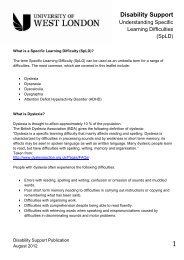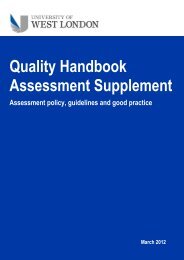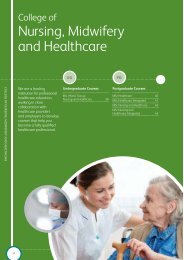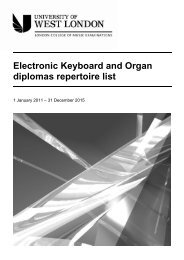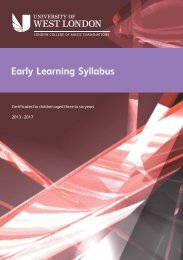LCM Exams - Jazz Diplomas Syllabus - University of West London
LCM Exams - Jazz Diplomas Syllabus - University of West London
LCM Exams - Jazz Diplomas Syllabus - University of West London
You also want an ePaper? Increase the reach of your titles
YUMPU automatically turns print PDFs into web optimized ePapers that Google loves.
Ireland; RCT Grade 2 Rudiments in Canada. There is no theory pre-requisite for Pr<strong>of</strong>iciency Leisure Play.<br />
Details <strong>of</strong> pre-requisite qualifications for diplomas are outlined in full in the relevant syllabuses.<br />
10. Substitutions: Only candidates <strong>of</strong>ficially entered will be accepted for examination. Substitution <strong>of</strong> a<br />
candidate in place <strong>of</strong> a candidate originally entered will not be allowed.<br />
11. Transfers: Transfer <strong>of</strong> candidates from one centre to another will not be considered unless there are<br />
exceptional circumstances which have been approved prior to the transfer by <strong>LCM</strong> Examinations. Transfers will<br />
only be administered on receipt <strong>of</strong> the transfer fee.<br />
12. Examination appointments: An Attendance Notice detailing the date, time and venue <strong>of</strong> the examination will<br />
be issued to each candidate, via the correspondence address on the entry form, not later than two weeks<br />
before the date <strong>of</strong> the examination. This should be retained by the candidate, and handed to the attendant on<br />
the day <strong>of</strong> the examination. <strong>LCM</strong> Examinations should be informed immediately if there are any errors on the<br />
Attendance Notice. An incorrect grade or subject cannot be changed on the day <strong>of</strong> the exam, and spelling<br />
corrections will incur a fee if notified after the issue <strong>of</strong> the certificate. Candidates should arrive at the venue<br />
no later than 15 minutes before the scheduled time <strong>of</strong> the examination.<br />
13. Conditions at public centres: A quiet room will be provided. Every effort will be made to ensure that the<br />
candidate is not disturbed by outside noise. The room will be <strong>of</strong> a moderate size, but with sufficient room to<br />
enable candidates to perform effectively. A good quality, tuned piano, with a stool, will be provided. A music<br />
stand will be provided for instrumentalists. Guitarists should bring their own footstool. Electronic Keyboard<br />
candidates should bring their own keyboard stand, if required; however, a table and power source will be<br />
provided. A waiting room will be provided, and a warm-up room where available.<br />
14. Digital pianos: Good quality digital pianos may be used for examinations up to Grade 8 level. They may NOT<br />
be used for diplomas (except <strong>Jazz</strong>, Music Theatre, and Irish and Scottish Traditional diplomas). Where a digital<br />
piano is used, centres must inform all candidates and/or teachers at the time <strong>of</strong> entry.<br />
15. Examination procedure: The examination components will normally be conducted in the order shown in the<br />
syllabus, unless the candidate requests otherwise. Examiners will normally <strong>of</strong>fer a brief warm-up period <strong>of</strong><br />
approximately 1 minute to candidates taking Grade 5 or higher. Where other candidates require warm-up<br />
time, the examiner should be informed accordingly. For sight-reading components, candidates will be given<br />
approximately one minute's preparation time, during which they may study and try out short sections <strong>of</strong> the<br />
extract, but they may not play the complete extract through until asked to do so by the examiner. (NB. This<br />
does not apply to tests in Electronic Keyboard and Organ examinations, where different guidelines apply).<br />
16. Admission to the examination room: Practical examinations are conducted in closed conditions. No-one,<br />
apart from the candidate and the examiner(s), is allowed into the examination room with the following<br />
exceptions:<br />
(a) an accompanist, who may be present only for those parts <strong>of</strong> the examination where they are required;<br />
(b) for candidates aged 12 and under who are using pre-recorded backing tracks, an adult operating the<br />
playback equipment, who may be present only for those parts <strong>of</strong> the examination where they are required<br />
(see Regulation 23);<br />
(c) an approved person, such as a parent or teacher, in Early Learning or Pre Preparatory examinations;<br />
(d) an approved person, such as a parent or teacher, or a language interpreter, where this concession has<br />
been granted prior to the examination as the result <strong>of</strong> a request for reasonable adjustments for a<br />
candidate with particular needs (see Regulation 35);<br />
(e) a chaperone for Music Theatre candidates (see Music Theatre syllabus guidelines);<br />
(f) an audience for F<strong>LCM</strong> recitals (see individual syllabuses for further guidelines);<br />
(g) an instrumental or vocal ensemble for Conducting examinations.<br />
Page-turners are NOT allowed, unless in exceptional circumstances, and with prior approval from <strong>LCM</strong><br />
Examinations. (Please see Regulation 22a below).<br />
17. Use <strong>of</strong> music in examinations: With the exception <strong>of</strong> certain examinations (see below), candidates must use<br />
published editions <strong>of</strong> all music performed in the examination, whether published by <strong>LCM</strong> Examinations or by<br />
other publishers. Where a certain published edition is listed in the syllabus repertoire, candidates may use any<br />
alternative published edition <strong>of</strong> the music, provided that this is not a simplified version. Candidates should<br />
ensure that they have obtained all the necessary music before submitting an entry. Where a candidate wishes,<br />
or is required, to perform from memory (e.g. in Music Theatre exams), published editions <strong>of</strong> the music must<br />
still be available for the examiner’s reference. Diploma candidates must bring additional copies <strong>of</strong> the music<br />
for the examiners’ reference; photocopies may be used for this purpose. NB. Candidates are not required to<br />
use or provide published editions in the following examinations: Popular Music Vocals, Irish and Scottish<br />
Traditional Music.<br />
33



